Category / Uncategorized
Brightspace focus group
If your students have been using Brightspace this academic year, then BU’s Marketing & Communications Department would like to hear from them to find out what’s been good, what hasn’t, how it can be made better.
A discussion group is taking place at 12pm on Tuesday 28 November on Talbot Campus for an hour and as a thank you, students will be treated to some pizza.
All students at BU will be moving from myBU to Brightspace next September so their feedback will be really useful in making sure Brightspace meets the needs of our students. Responses will be kept anonymous.
If any of your students would like to take part, please email the project team with their course name and year of study, and they’ll be in touch with more details.
Public Engagement – Evaluation is key
Something that is just as important as engaging the public in your research is gauging the impact of your event. Academics can use evaluation to help improve future research activities or understand if their event was successful in making impact with the general public.
Don’t be generic
When looking at generic feedback and evaluation forms, they don’t give much help in analysing the success of your event. If you want to know how many points out of 10 you get then look no further than your average Likert scale!
However, there is a wealth of other opportunities to understand and evaluate how impactful your events are – these opportunities are something the Knowledge, Exchange, and Impact Team love to collect.
Inspire us
If you have any ideas, or want to be inspired then don’t hesitate to get in touch for examples of what you can to do evaluate your public engagement event – we are always open to expand the evaluation repertoire.
BU’s PGR Isabell Nessel at the 4th International Congress of the European Milk Bank Association
The European Milk Bank Association (EMBA) (www.europeanmilkbanking.com) held its 4th International Congress in Glasgow in early October. After a civic reception from Glasgow’s Mayor, at Glasgow’s magnificent City Chambers, the conference started with a warm welcome from Scotland’s Minister for Public Health and Sport.
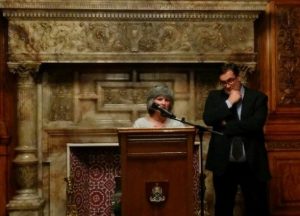 Debbie Barnett, Donor Milk Bank Coordinator of the Scottish Greater Glasgow and Clyde Donor Milk Bank, and Jean-Charles Picaud, President of EMBA, welcoming the conference attendants.
Debbie Barnett, Donor Milk Bank Coordinator of the Scottish Greater Glasgow and Clyde Donor Milk Bank, and Jean-Charles Picaud, President of EMBA, welcoming the conference attendants.
Although it was a European conference, attendants from 35 countries from all over the world exchanged their research results, knowledge, and experience about human milk banking, with the aim to support the health of (preterm) babies. One important topic of the conference was the research into better thermal treatment of donor human milk. (http://embacongress.it/documenti/Program20170920.pdf)
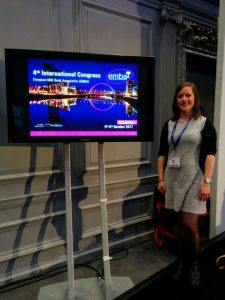 I presented the results of our national milk bank survey, which we conducted earlier this year. The study was the first national audit of human milk banking practices in the U.K. with the aim to protecting and preserving omega-3 and omega-6 long chain polyunsaturated fatty acids in donor human milk. The survey identified large variations in all practices of human milk banking, including, donor selection, transportation, and storage and handling of donor milk, and nutritional information provided for donors.
I presented the results of our national milk bank survey, which we conducted earlier this year. The study was the first national audit of human milk banking practices in the U.K. with the aim to protecting and preserving omega-3 and omega-6 long chain polyunsaturated fatty acids in donor human milk. The survey identified large variations in all practices of human milk banking, including, donor selection, transportation, and storage and handling of donor milk, and nutritional information provided for donors.
This conference was a perfect opportunity for me, to talk to the respondents of the audit, to present our results, and to network with potential collaborators to facilitate further research into donor human milk in the U.K.
Many thanks to EMBA for the invitation to present my research, to all the participants of the survey, and to BU for the funding to attend this conference.
If you would like to learn more about human milk banking in the U.K. please visit the UK Association for Milk Banking website http://www.ukamb.org/
If you would like to learn more about our research, please feel free to contact me at inessel@bournemouth.ac.uk
Isabell
The slow process from public health research to law
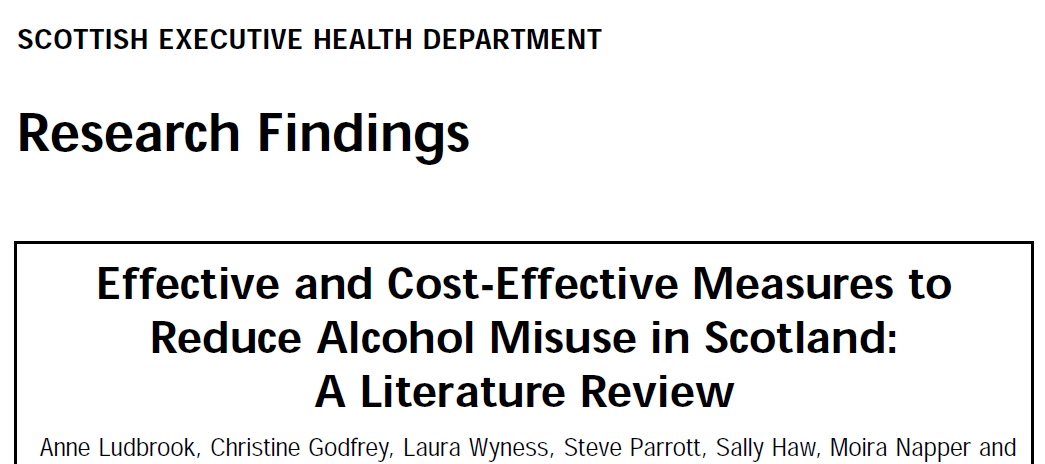 We know that public health works and thinks long-term. We’ll typically see the population benefits of reducing health risks such as tobacco use, obesity and high alcohol intake in ten or twenty years’ time. But we often forget that preceding public health research into the determinants of ill health and the possible public health solutions is also slow working. Evidence-based public health solutions can be unpopular with voters, politicians or commercial companies (or all). Hence these take time to get accepted by the various stakeholders and make their way into policies.
We know that public health works and thinks long-term. We’ll typically see the population benefits of reducing health risks such as tobacco use, obesity and high alcohol intake in ten or twenty years’ time. But we often forget that preceding public health research into the determinants of ill health and the possible public health solutions is also slow working. Evidence-based public health solutions can be unpopular with voters, politicians or commercial companies (or all). Hence these take time to get accepted by the various stakeholders and make their way into policies.
 I was, therefore, glad to see that Scotland won the Supreme Court case today in favour of a minimum price for a unit of alcohol. As we know from the media, the court case took five years. Before that the preparation and drafting of the legislation took years, and some of the original research took place long before that. Together with colleagues at the Health Economic Research Unit at the University of Aberdeen, the University of York and Health Education Board for Scotland, we conducted a literature review on Effective & Cost-Effective Measures to Reduce Alcohol Misuse in Scotland as early as 2001 [1]. Some of the initial research was so long ago it was conducted for the Scottish Executive, before it was even renamed the Scottish Government.
I was, therefore, glad to see that Scotland won the Supreme Court case today in favour of a minimum price for a unit of alcohol. As we know from the media, the court case took five years. Before that the preparation and drafting of the legislation took years, and some of the original research took place long before that. Together with colleagues at the Health Economic Research Unit at the University of Aberdeen, the University of York and Health Education Board for Scotland, we conducted a literature review on Effective & Cost-Effective Measures to Reduce Alcohol Misuse in Scotland as early as 2001 [1]. Some of the initial research was so long ago it was conducted for the Scottish Executive, before it was even renamed the Scottish Government.
Prof. Edwin van Teijlingen
CMMPH
Reference:
Research started years ago! Ludbrook et al.(2002) Effective & Cost-Effective Measures to Reduce Alcohol Misuse in Scotland: Lit Review, HERU, Univ. of Aberdeen. [ISBN: 0755932803] http://www.gov.scot/Resource/Doc/1124/0052548.pdf
ADRC attend National 12th UK Dementia Congress, Doncaster

The Ageing & Dementia Research Centre (ADRC)’s Prof Jane Murphy and Joanne Holmes presented their research impact findings on Nutrition and Dementia Care at the National 12th UK Dementia Congress on 8th and 9th November 2017. The outputs of the research are a toolkit of education and training for nursing and care staff (http://www.bournemouth.ac.uk/nutrition-dementia). To date the research evaluation (using a combination of questionnaire and interviews) has demonstrated highly positive feedback that includes ways to change practice to improve person-centred nutritional care. At the conference there were a wide range of presentations with focus on topics including aspects of training, delivery of care, seldom heard voices, design and technology, human rights aimed at carers and across care homes, hospitals, home care and migrant communities. Health Education England (HEE) also had a poster presentation that highlighted the work the ADRC have undertaken using DEALTS 2 (Dementia Education And Learning Through Simulation 2) programme as a train the trainer programme to all 13 HEE regions across England.

Public Engagement – why keep it on campus?

The British Science Festival was a fantastic opportunity to see the weird and wonderful places you can engage people in science! Locations for events ranged from lecture theatres on campus to a karaoke bar down in the lanes… certainly a wide range of options to attract anyone and everyone.

All the different locations dotted around Brighton
It’s a good idea to look into the unique places around Bournemouth that might be better for your research than on campus – you can see in the map that the British Science Festival had a large majority of their events in the city centre instead of up on the University grounds. This made it easier for visitors of the city to find the events they wanted.
It would be great for both community and BU to see all of Bournemouth town used to engage the public in the Festival of Learning – whether it is a night time event to keep the fun going to the early hours, or an event closer to the station to help the public find it’s location without all the buses. When thinking of an event you can run for the Festival of Learning, just remember – why keep it on campus?
If you have any ideas and want to run them by us at the Knowledge Exchange and Impact Team, send us an email and we will get back to you as soon as we can!

HE Policy Update w/e 10 November 2017
HE Policy Update
w/e 10 November 2017
A research funding crisis?
Follow this link to read the A research funding crisis? summary with all the diagrams and charts.
Or read the summary below without the charts.
Ahead of the Autumn 2017 Budget the Higher Education Policy Institute (HEPI) has published How much is too much? Cross-subsidies from teaching to research in British Universities written by Russell Group PG Economics student Vicky Olive. The paper concludes that research within universities is reliant on subsidy by tuition fee funding. As international students pay higher fees more of their fees go towards research than home and EU students. The paper concludes that on average international students contribute £8,000 from their total fees towards research. While the figures vary between universities, in 2014/15 teaching income funded 14% of English university research (approx. £1 in every £7 spent).
The paper argues that although the UK has a leading global research performance (see diagram below) R&D expenditure is well below competitor nations and unsustainable in the long term.
The paper argues that In 2014/15 the UK HE sector had a sustainability gap of £1 billion. This is described as a looming crisis because of a number of factors:
- the focus on value for money for students paying tuition fees
- Brexit threats to EU research funding
- the unwelcoming nature of current immigration policy
- the improvement of HE education in countries where the UK traditionally recruits international students
- the impact of UK austerity policy which has seen limited science and research budget growth.
The Conservative Government’s has a target to increase R&D spend to 3% of GDP. The paper suggests that to realise this target the following would need to occur:
- the UK would need an additional 250,000 full fee-paying international students;
- Research Councils and Funding Councils to spend an additional £3 billion on funding research;
- industry to contribute an additional £700 million;
- charities to contribute an additional £830 million;
- government departments to contribute £760 million extra each year.
Current R&D expenditure is 1.7% of GDP (25% of which spend by HEIs, 66% of spend by industry). The Government has announced additional investment of £4.7 billion by 2020/21 for R&D, however, the paper argues this isn’t enough and that other sectors must also increase their investment. The paper summarises recent Government policy related to R&D budgets.
The paper considers, and discards, the notion of only providing QR funding for 4* research.
In addition to her calls to increase research investment the author states her aim is to bring together UKRI and OfS to facilitate a sensible research funding model which neither underfunds or jeopardises research sustainability nor exploits students. The paper also urges universities to push back and recover a greater proportion of full economic cost from industry funders, particularly when the research is not directly for the public good.
Nick Hillman, Director of HEPI, commented : ”Anyone who wants to end cross-subsidies must say how they would fund universities’ various roles properly. There are three pressing issues. First, those who fund university research – public and private funders as well as charities – do not cover anything like the full costs. Secondly, the cross-subsidy from tuition fees to research is probably not sustainable at current levels. Thirdly, the Government wants a near doubling in research and development spending as a share of GDP, yet recent funding injections are only enough to stand still.
Our conclusion is that the Chancellor needs to find another £1 billion for research in this year’s Budget, with some set aside for the work universities do with charities. But even this level of additional funding would mean stagnation relative to other countries. So we also need a strategy for increasing research spending to OECD levels over the next few years and German levels thereafter – as promised in the 2017 Conservative manifesto.
The Times covered the report in University research subsidised with £281m from tuition fees.
Separately but relevant to this debate:
- THE have written about the latest OECD data stating it shows a levelling off in global numbers of mobile students after the exponential growth of late 1990s and 2000s – read Data bite: international student flows in focus.
- As we near the Autumn 2017 Budget parliamentarians have been calling on the Government to support their campaigning interests. This week Vince Cable (Lib Dem Leader) covers education and research and development in his pre-budget speech: “Long term studies by the LSE have shown that the two main determinants of poor UK performance on productivity are lack of innovation (R&D as opposed to basic science where the UK is strong) and low levels of skills. The former problem is being addressed by R&D tax credits and by the work of Innovate UK, in particular the Catapult network, which Liberal Democrats launched in government as part of the Industrial Strategy.
- The latter is a far less tractable problem and despite the progress we made in the Coalition in raising the number and quality of apprenticeships, especially Higher Apprenticeships, the programme is now slipping backwards largely because of clumsy implementation of the apprenticeship levy and the neglect of careers advice and guidance….a budget built around the industrial strategy, prioritising education and skills, R&D and infrastructure would, at the very least, send the right signals.”
Interdisciplinary Research
HEFCE have opened sub-panel nominations for roles related to IDR within REF 2021 aiming to support and promote the fair and equitable assessment of IDR outputs and environment through:
- the inclusion of Interdisciplinary Research advisers on each sub-panel
- the continuation of the optional IDR flag
- the inclusion of a specific IDR section in the environment template
In September HEFCE blogged on the importance of academics within interdisciplinary research culture in What creates a culture of interdisciplinary research? HEFCE described what the new IDR role may look like in Wednesday’s blog REF 2021: Where are we on interdisciplinary research?
Widening Participation and inclusivity
OFFA has commissioned a new evidence based research study: Understanding and overcoming the challenges of targeting students from under-represented and disadvantaged ethnic backgrounds.
HEA and Runnymede Trust will analyse existing practice across the sector and ‘produce a suite of practical guidance to support staff in a variety of different roles within universities and colleges in overcoming the challenges associated with this work’. The project is part of OFFA’s long-term aim to challenge and support universities and colleges to do more to address the differences in higher education participation, attainment and progression to further study or employment that persist between students from different ethnic groups.
Les Ebdon: “Black and minority ethnic (BME) students have been a key target group for OFFA for a number of years. But our research suggests that universities and colleges are struggling to target the activities they deliver through their access agreements where they are most needed…This project will help us understand how activities can be targeted appropriately and effectively towards students from disadvantaged and under-represented ethnic backgrounds, enabling OFFA to better support universities and colleges to accelerate progress in this crucial area.”
Principal Investigator, Jacqueline Stevenson, stated: “Our intention is not just to indicate the barriers institutions are facing, but also what they are able to do to address these entrenched and long-standing inequalities.”
Scope call for inclusive workplaces: Scope has called on the Dept for Work and Pensions to develop universal, industry-standard information and best practice guidance for all businesses to support their employment and management of disabled people. Scope’s new research Let’s Talk found many disabled people struggle to share information about their impairment or condition in the workplace making it hard for them to access the support and adjustments they need to carry out their job.
Question to the Dept for Education: Office for Students
Andrew Percy (Con): Whether the remit of the Office for Students will include anti-discrimination on campus.
Jo Johnson (Con, Minister of State for Universities, Science, Research & Innovation): The government has published a consultation on behalf of the new Office for Students (OfS) regarding the regulation of the higher education sector. It proposes that, in its regulatory approach, the OfS will look to ensure that all students, from all backgrounds can access, succeed in, and progress from higher education.
Higher Education (HE) providers are autonomous organisations, independent from Government, and they already have responsibilities to ensure that they provide a safe, inclusive environment, including legal obligations under the Equality Act 2010 (the Act) to ensure that students do not face discrimination.
The OfS, like some HE providers, will also have obligations under the Public Sector Equality Duty in part 11 of the Act. This includes a requirement that the OfS, when exercising its functions, has due regard to the need to: eliminate unlawful discrimination, harassment and victimisation and any other unlawful conduct in the Act, advance equality of opportunity, and foster good relations in relation to protected characteristics.
In addition, in September 2015 the government asked Universities UK (UUK) to set up a Harassment Taskforce, composed of university leaders, student representatives and academic experts, to consider what more can be done to address harassment and hate crime on campus. The taskforce published its report, ‘Changing the Culture’, in October 2016, which sets out that universities should embed a zero-tolerance approach to sexual harassment and hate crime. This includes hate crime or harassment on the basis of religion or belief, such as antisemitism and Islamophobia. The Higher Education Funding Council for England is currently working with UUK to test the sector’s response to the Taskforce’s recommendations and the results of this will be published early in 2018.
House of Lord Questions – Disabled Student Allowance
Lord Addington (Lib Dem) has asked three parliamentary questions regarding the disabled students allowance.
Q1: Whether the evaluation of Disabled Students’ Allowances will include consideration of the need for third party advisers to have clarity of information about the respective responsibilities of higher education providers and claimants of those allowances.
Q2: Whether the evaluation of Disabled Students’ Allowances will include consideration of the benefits of issuing a guide to higher education providers about their responsibilities in relation to students claiming those allowances who fall into bands 1 and 2.
Q3: Whether the evaluation of Disabled Students’ Allowances will include consideration of the levels of information provided by higher education providers to students claiming those allowances about the respective responsibilities of those institutions and students.
The Earl of Courtown provided the same (non-)response to all three questions:
A: The evaluation of Disabled Students’ Allowances (DSA) will address a range of factors relating to the efficacy of support for disabled students, including the effect of recent changes to DSA policy.
Parliamentary Questions
Question to the Home Office – Visas: Overseas Students
Q -Jo Stevens (Labour): How much was accrued to the public purse from charging international students applying for Tier 4 student visas in each year since 2010.
A – Brandon Lewis (Con, Minister of State for Immigration): Visa income is not differentiated between the various categories in which they are received. Visa volumes by broad category (study, work etc) are published in the data section of this webpage: LINK Fees and unit costs are also published, for example, for 2017/18: LINK
Private Providers
Lord Storey (Lib Dem) has tabled two questions about the quality of private providers:
Q1 – On how many occasions in the last three years the Quality Assurance Agency for Higher Education has (1) raised concerns, and (2) taken action, regarding private colleges and providers of degrees
Q2 – What measures they are taking to provide quality assurance for students studying degree courses at a private college whose degrees are validated by a university
These are due for answer on Tuesday 21 November.
Consultations
Click here to view the updated consultation tracker. Email us on policy@bournemouth.ac.uk if you’d like to contribute to any of the current consultations.
New consultations and inquiries this week:
- Two Dept for Health consultations on nursing, and one on regulation and workforce development of the health services
- Jo Johnson has announced the sector will be asked for their opinion on two year degrees in a forthcoming consultation
Other news
Student Engagement: Guild HE have written for Wonkhe censuring the limited nature of student consultation and engagement proposed through the new Quality Code and critiquing both the TEF and the Office for Students in Engaging students as partners: two steps forward, one step back.
HE Policy Briefings
Awareness of policy is integral to many roles at BU and with HE constantly in the news it can be hard to sort the wood from the trees to keep current. We’re running two short and sharp HE Policy Briefings during November and December; all are welcome so come along to learn more!
The briefings will:
- present the latest policy developments for universities and how they may affect BU, our staff and students
- cover the next steps for the Teaching Excellence Framework, including subject level TEF, and how this could impact BU
- support you to consider actions you could take to prepare for change and challenges arising from these development.
Email organisational development to attend on: Wed 22 November 12-13:00 at Lansdowne or Thurs 7 December 12-13:00 at Talbot (mince pies included!)
Subscribe!
To subscribe to the weekly policy update simply email policy@bournemouth.ac.uk
JANE FORSTER | SARAH CARTER
Policy Advisor Policy & Public Affairs Officer
65111 65070
Follow: @PolicyBU on Twitter | policy@bournemouth.ac.uk
Creative Writing for Academics with Kip Jones

A two-day FREE workshop in creative writing with Kip Jones for Bournemouth University staff and students only.
Writing week: Wednesday 3 Jan and Thursday 4 Jan.
Wed: 9:30 – 3:30
Thurs 9:30 – 12:30 (followed by lunch at La Piccola Italia)
Executive Business Centre, 7th Floor
Places are limited, but the workshop is free. Please express your interest by emailing Kip asap. You will be expected to attend for both days, and attend the lunches. You are asked to buy your own refreshments and lunches, but we will eat together at a restaurant each day. The first day we will go to the International Centre next to EBC for lunch. The second day, we will have a concluding longer lunch at La Piccola Italia Restaurant, near EBC. Writing is a very solitary endeavor. Sharing of experiences and conviviality are important components of a balanced approach.
Summary: The Creative Writing workshop will be a unique event in that it will not be a typical ‘writing retreat’ (with trees to hug and lots of time to ruminate), but rather a very active experience with lots of exercises, suggestions and supportive feedback on participants’ work from Kip Jones and other participants. The point is to encourage both students and academics who would like to include more creative writing in their outputs, particularly those whose writing includes reporting on narrative and other qualitative methods of research. It also helps immensely in the move to publishing in the wider world of blogs and online outlets, moving work to media and film, auto-ethnography and even fiction.
Justification: The important point of Creative Writing for Academics is to help academics and students achieve the goal of seeing more of their work read by wider audiences; in other words, impact. By providing an intense two-day experience for participants to engage in developing writing skills, the playing field is levelled and opportunities for facilitated learning developed. By engaging in creative writing, it becomes possible for all to write more clearly, more simply, even more creatively, when writing not only for academic publications, but also for outlets previously unimagined.
Methods: The workshop will present opportunities to work with academic material and expand its means of production and dissemination to new and creative levels through interfaces with techniques from the arts and humanities, including blog and magazine writing, film treatments and scripts, and poetry and fictional exercises. These intellectual exchanges encourage joint exploration of how researchers can engage with principles and tools from the arts in order to expand and extend the possibilities of dissemination of research data. Concepts of creativity itself will evolve and be transformed by participants’ outlooks and willingness to engage with unfamiliar territory. These processes comprise ‘facilitated learning’—in that knowledge will be gained as a secondary goal through a process of developing new relationships through small group problem-solving and self examination, grounded in personal past experience and knowledge.
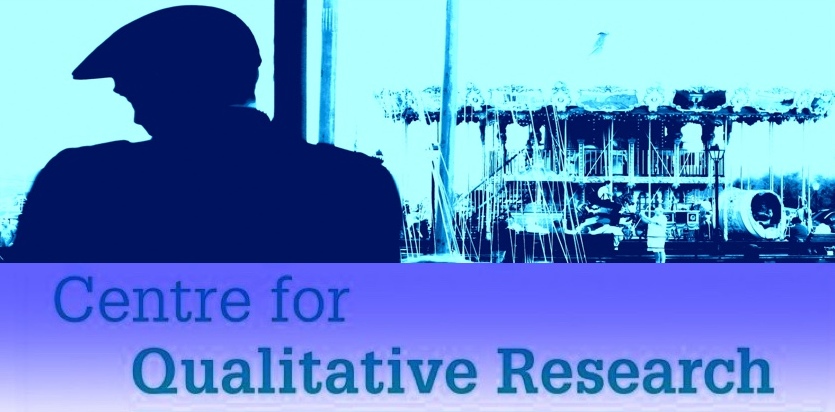
ADRC Invited presentation to the University of Bath
On Tuesday 26th September, ADRC’s Dr Samuel Nyman was invited to present to the Department of Health, University of Bath.
He presented on, “Promotion of physical activity among people with dementia: A behaviour change perspective”.
A seminar room filled with staff and postgraduate students were interested to learn about the TACIT Trial .
Dr Nyman provided the rationale for the study along with the approach taken to delivery of the intervention. We are harnessing participants’ implicit memory, which remains relatively intact in people with dementia.We are also using behaviour change techniques to help people get as much benefit from the free Tai Chi course.
To find out more please see our webpage, Facebook page, and YouTube video
Deadline Approaching – Call for Something: Disrupting Research Practices
The Doctoral College and Centre for Research Capability and Development at Coventry University will be holding a one day conference happening on Friday 19th January 2018. Our Call for Something is currently open and closes on 12th November. For more information on the event and the full CFS, please follow the link:
https://sway.com/SeG6cezMbHXXh8FY?ref=Lin
For further details, please contact Dr Kieran Fenby-Hulse
The power of Bilding!

I was lucky, and honoured, in late October to visit Vechta, Lower Saxony, to give a keynote at the Gemeinsame Werte in Europa? (Common values in Europe?) conference as part of a European-wide celebration of 30 years of Erasmus funding and exchanges. Having acted as part of a European-wide panel on the future of Erasmus – especially post-Brexit – my keynote address dealt with the challenges of ‘precarity’ for many of our citizens throughout Europe and the need for radical social action to confront the increasing insecurities, uncertainties and inequities within contemporary society. It was a plea for European solidarity and action against neoliberal atomisation and its debilitating effects on the communitas, something that resonated with the European and international audience.
Last week my colleague from Universität Vechta, Magnus Frampton, continued the dialogue begun in Germany by offering an important seminar ‘What’s in a word? Bildung and pedagogy: two German understandings of education’ which explored, amongst other things, Wilhelm von Humboldt’s legacy to education. This was important in reminding us that education specifically focusing on the requirements of the economy or business is potentially damaging to the individual. It reminds us that the human and the social is central.
So, as we contribute to developing education, meaning and society, not as a linear project of the enlightenment but as a means of cultivating the self and the social and in shaping and creating anew who we are as human beings, we need to challenge and to question, to resist and make new rather than to be moulded as economic units for those with power. Long may the potential of Erasmus offer this academic freedom!
Jonathan Parker

ESRC Festival – Weekend fun outdoors

O n Sunday BU and RSPB staff along with volunteers from SUBU enjoyed hearing what young people under 12 years old thought about about being outdoors.
n Sunday BU and RSPB staff along with volunteers from SUBU enjoyed hearing what young people under 12 years old thought about about being outdoors.
The research team welcomed over 60 children to the KingFisher Barn to take part in this ESRC Festival of Social Sciences event. There were various outdoor activities for the young people to try including den building in the woods. Many of the fun activities also gave young visitors the opportunity to share their ideas about the importance of spending time outdoors playing with friends or family. Many of the young visitors added their ideas to the event’s ‘Big ideas Trees’. There was also the chance for them to suggest how green spaces could be improved to make them more attractive as places to play. Not all the data has been analysed yet but it would seem for the under 5’s one popular enhancement to any green space would be more muddy puddles!
ESRC Festival event: Me and my green space

On Sunday the Kingfisher Barn, Muscliffe will be the venue for an ESRC Festival event. BU staff from the Faculties of Health and Social Sciences and Media and Communications have developed the event in collaboration with the RSPB and Bournemouth Borough Council Parks. The event called Me and my green space is aimed at young people aged 12 years and under. There will a range of activities to help open a dialogue with younger visitors about what they think green spaces are, do they use them during play and if so what type of activities they like to do in the green spaces they visit. The research team is also interested in whether the young people have ideas about improving access to green spaces or any thoughts about how these areas could offer more enjoyment to younger visitors. The activities on offer will be den building, arts and crafts based on natural materials, an arboretum trail and river dipping. SUBU are helping to support the delivery of several of these activities. The event will end with a lantern trail to light up the woodland area around the Kingfisher Barn. All the research team – Holly Crossen-White, Angela Turner-Wilson (HSS), Annie East and Nathan Farrell (FMC) – invite you to come along and enjoy some outdoor fun – and the weather is going to be good too!
BU Senior Academic Appointed As Research Fellow In The Centre For Military Studies, Faculty of Military Science at Stellenbosch University, RSA
Can you beat the clock?
Can you beat the clock?
Deadline for the Doctoral College 3MT application has been extended to Monday 5 February 2018.
For more information, eligibility and how to apply visit the website.
Don’t miss out on the chance to win £400 towards a conference of your choice, plus entry into the Vitae National 3MT competition plus £100 voucher.

“Using photo-elicitation to generate storytelling”
Join us next Wed for “Using photo-elicitation to generate storytelling” presented by Anne Quinney.
Anne’s co-presenter, Maggie Hutchings, is now able to join her for the conversation!
Lots of opportunity for audience participation in listening, making, and sharing. Not lectures, the seminar is ‘In Conversation” about a topic or method. No PPT and plenty of time for audience interaction and feedback!
Wednesday, 1 Nov.
Royal London House 208 1 pm
Students and Faculty welcome!
Presented by the Centre for Qualitative Research
CMMPH student wins The Postgraduate Research Prize
Ms. Sheetal Sharma who will be graduating from Bournemouth University with a Ph.D. on November 10th has been awarded Bournemouth University’s The Postgraduate Research Prize. This prize is for the postgraduate student whose achievement is deemed by the Vice-Chancellor to have been most outstanding in their time at BU.
Sheetal stood out as a Ph.D. student as her maternal health research project in Nepal resulted in several many publications [1-6], some in very prestigious journals such as BMC Pregnancy & Childbirth [4] and PLOSOne [5] . She won the best poster prize at the international GLOW conference in Birmingham in 2013 with the poster presentation ‘Getting women to care in Nepal: A Difference in Difference analysis of a health promotion intervention’. She won a SBSP travel scholarship to present a poster at the 8th European Congress on Tropical Medicine & International Health in 2013 in Denmark. Sheetal’s abstract of the poster was also officially published [7].
Sheetal presented at the Science in Society conference (SiS) at Berkeley University in November 2012 where she received a Graduate Scholar Award. In addition, she won a Santander travel scholarships for £5,000 to learn about research at the University of Buenos Aires, Institute for Clinical Effectiveness & Health Policy (Argentina) and at the University of Barcelona in Spain. This scholarship resulted in a great publication with the world-famous researcher in reproductive health care prof. Jose Belizan as co-author. Sheetal also presented her work at the first ever national health promotion conference in Nepal.
Sheetal also had less academic achievements as she won the BU photo competition at the 2014 PGR conference with the photo in this blog. 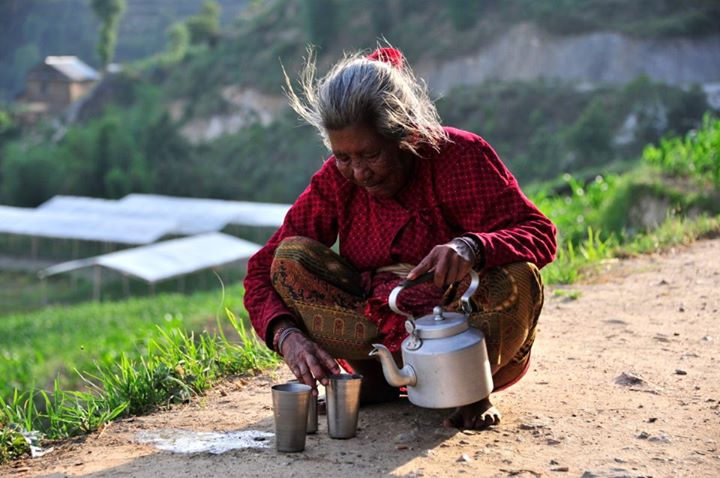
Sheetal was also actively involved as a student representative in the Faculty of Health & Social Sciences as well as in the Graduate School. She even found time to join the editorial board of the newly formed Journal of Asian Midwives.
Over the past five years Sheetal has had many mentions on this BU research blog as one of BU’s most prolific publishing PhD students.
As supervisors and co-authors we are proud of her!
Dr. Catherine Angell, Prof. Vanora Hundley & Prof. Edwin van Teijlingen (CMMPH)
BU Visiting Professor Padam Simkhada, Liverpool John Moores University
Dr. Elisa Sicuri, Assistant Research Professor at ISGlobal, Spain
Prof. Jose Belizan, University of Buenos Aires, Argentina
References to published work by Sheetal Sharma:
- Joshi, R., Sharma, S., van Teijlingen, E. (2013) Improving neonatal health in Nepal: Major challenges to achieving Millennium Development Goal 4, Health Science Journal 7(3): 247-257. http://www.hsj.gr/index.files/Page1421.htm
- Sharma, S., Joshi, P., van Teijlingen, E. (2015) ‘Nepenglish’ or ‘Nepali English’: A new version of English? Asian Journal of Humanities & Social Sciences 4(2): 188-193. www.ajssh.leena-luna.co.jp/AJSSHPDFs/Vol.4%282%29/AJSSH2015%284.2-21%29.pdf
- Simkhada, B., Sharma, S., van Teijlingen, E., Silwal, RC, Simkhada, P. (2015) Exploring Maternal Mortality Reduction. In: Wasti, SP, Simkhada, PP, van Teijlingen, E. (Eds.) The Dynamics of Health in Nepal, Kathmandu: Social Science Baha & Himal Books: 95-121.
- Sharma, S., van Teijlingen, E., Belizán, J.M., Hundley, V., Simkhada, P., Sicuri, E. (2016) Measuring What Works: An impact evaluation of women’s groups on maternal health uptake in rural Nepal, PLOS One 11(5): e0155144 http://journals.plos.org/plosone/article?id=10.1371%2Fjournal.pone.0155144
- Sharma, S., van Teijlingen, E., Hundley, V., Angell, C., Simkhada, P. (2016) Dirty and 40 days in the wilderness: Eliciting childbirth and postnatal cultural practices and beliefs in Nepal BMC Pregnancy & Childbirth 16: 147 https://bmcpregnancychildbirth.biomedcentral.com/articles/10.1186/s12884-016-0938-4
- Sharma, S, Simkhada, P, Hundley, V, van Teijlingen E., Stephens, J, Silwal, RC, Angell, C (2017) Evaluating a Community Maternal Health Programme: Lessons Learnt. Journal Asian Midwives 4(1):3–20.
- Sharma, S., van Teijlingen, E., Hundley, V., Stephens J., Simkhada, P., Angell, C., Sicuri, E., Belizan, J.M. (2013) Mixed-methods evaluation of a maternity care intervention in rural Nepal: measuring what works, Poster P.2.3.004 (A), Tropical Medicine & International Health 18 (Suppl. 1): 108–231.
 Pleased to announce that a copy of the Handbook of Arts-based Research, Patricia Leavy, Editor, is now available at
Pleased to announce that a copy of the Handbook of Arts-based Research, Patricia Leavy, Editor, is now available at 














 FHSS academics teaching in Nepal
FHSS academics teaching in Nepal New weight change BU paper
New weight change BU paper One week to go! | The 16th Annual Postgraduate Research Conference
One week to go! | The 16th Annual Postgraduate Research Conference Geography and Environmental Studies academics – would you like to get more involved in preparing our next REF submission?
Geography and Environmental Studies academics – would you like to get more involved in preparing our next REF submission? Congratulations to three former BU staff
Congratulations to three former BU staff MSCA Staff Exchanges 2024 Call – internal deadline
MSCA Staff Exchanges 2024 Call – internal deadline Applications are now open for 2025 ESRC Postdoctoral Fellowships!
Applications are now open for 2025 ESRC Postdoctoral Fellowships! Horizon Europe – ERC CoG and MSCA SE webinars
Horizon Europe – ERC CoG and MSCA SE webinars MaGMap: Mass Grave Mapping
MaGMap: Mass Grave Mapping ERC grants – series of webinars
ERC grants – series of webinars